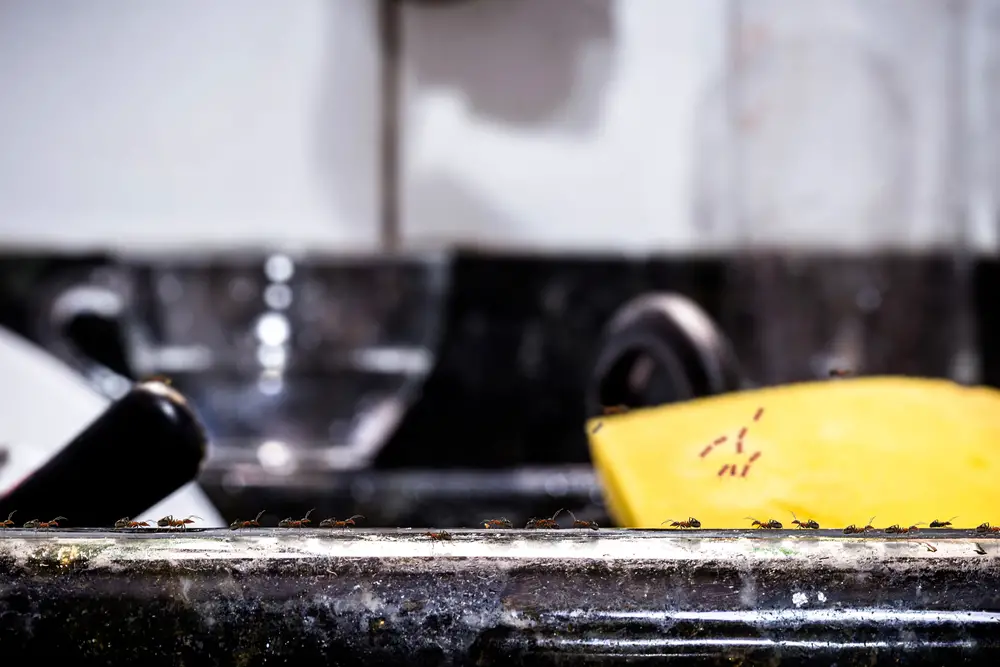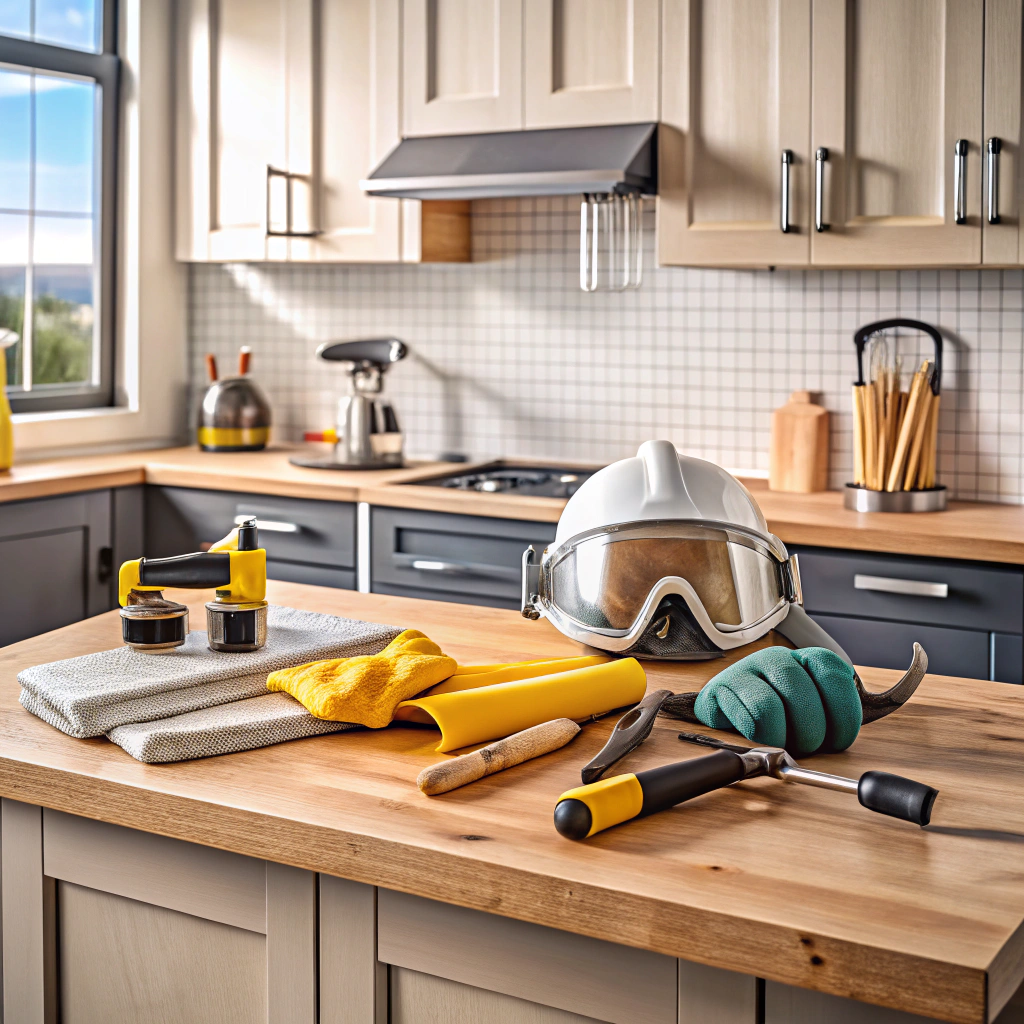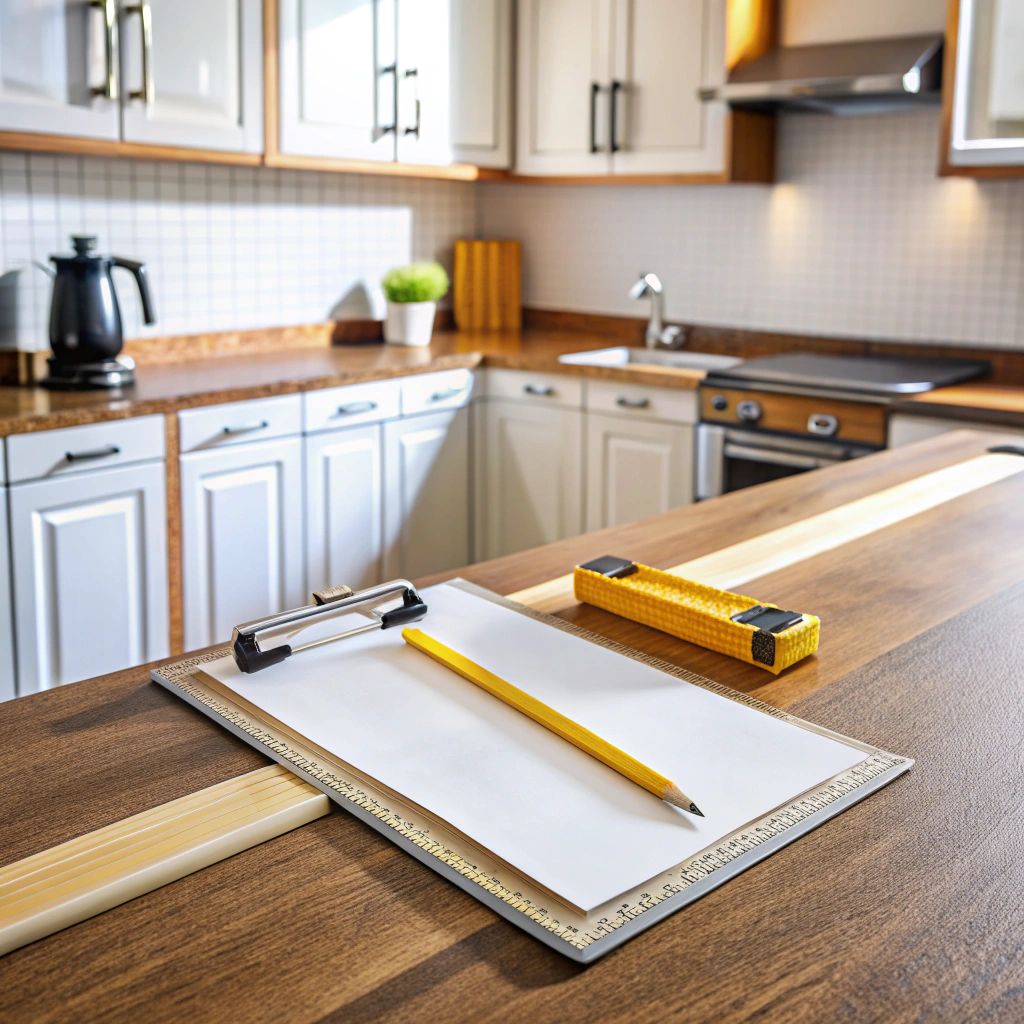Last updated on
Discover the surprising truth about whether ants can invade your kitchen through the drain and learn how to protect your home from these tiny intruders.
Have you ever been in your kitchen, minding your own business, when all of a sudden you see a trail of ants marching across your countertop? It’s not only annoying but also unsanitary. You clean up the mess and think everything is under control until you see more ants the next day.
You start to wonder how they keep getting in. Could they be coming up through the drain? In this article, we’ll explore whether or not ants can come up through the kitchen drain and what you can do to prevent them from invading your space.
What's Inside
Anatomy of a Kitchen Drain
A standard sink has two main components: a basin and a drain. The basin is where you wash dishes or prepare food, while the drain is responsible for carrying wastewater out of your home.
The drain consists of several parts that work together to ensure proper drainage. These include:
- Drain Pipe – This pipe connects your sink to the sewer system or septic tank.
- P-Trap – This curved section traps water in order to prevent sewer gases from entering your home.
- Cleanout Plug – This removable plug allows access for cleaning and maintenance purposes.
Ants are tiny creatures that can fit into small spaces, so it’s possible for them to enter through any gaps or cracks in these components. In fact, they may even build nests inside pipes if conditions are favorable.
Ants’ Access to Drain Pipes

They can easily crawl up walls, across ceilings, and even enter your home through small cracks in windows or doors. But what about drain pipes? Can ants really come up through the kitchen drain? The answer is yes! Ants have been known to use plumbing systems as a highway to access homes and buildings.
Drain pipes provide an ideal environment for ants because they offer moisture, food particles, and shelter from predators. Ants are attracted to any source of water or food in your home; therefore it’s not surprising that they would be drawn towards drains where there is often stagnant water and leftover bits of food.
It’s important to note that not all ant species will use drains as their entry point into your home. Some species prefer nesting outdoors while others may choose other areas inside such as behind baseboards or under appliances like refrigerators.
Common Ant Species in Kitchens
There are many different species of ants that can be found in kitchens around the world. Some of the most common ant species found in kitchens include Argentine ants, odorous house ants, pavement ants, pharaoh ants and carpenter ants.
Argentine Ants: These small brownish-black colored pests have become a major nuisance pest throughout much of California due to their large colony size which allows them to outcompete native ant species for resources.
Odorous House Ants: These dark brown or black-colored pests get their name from the unpleasant odor they emit when crushed. They often enter homes through cracks or gaps around windows and doors looking for sweet foods like honeydew produced by aphids on plants outside your home.
Pavement Ants: Pavement ant workers range from 2-4 mm long with light-brown bodies while queens can grow up to 7mm long with darker bodies. They nest under sidewalks but will also invade homes if there is an available food source nearby such as crumbs left on countertops or floors.
Pharaoh Ants: Pharaoh’s worker is about 1/16 inch (2 mm) long; queens may reach up to twice this length at maturity.They prefer warm environments like those found inside buildings where they feed on sweets such as sugar cubes left out by humans.
Carpenter Ants – Carpenter ant workers vary greatly in size ranging from about .25 inches (6mm) all the way up-to one inch(25mm).They do not eat wood but instead tunnel into it creating galleries where they lay eggs making them a serious threat if you have wooden structures within your kitchen area.
Why Ants Seek Kitchen Drains
The moisture and organic matter that accumulate in drains provide an ideal environment for ants to thrive. Ants can detect even the smallest amounts of sugar, grease, or other food particles in your drain pipes from far away using their keen sense of smell.
Moreover, some ant species prefer damp environments like those found inside drainpipes. They may build nests near or inside plumbing fixtures such as sinks and dishwashers where they have easy access to water sources.
Once ants find a way into your kitchen through the drainpipe system, they will leave pheromone trails behind them so that other members of their colony can follow suit. This is why you might see more than one ant at once – it’s not just one rogue insect but rather an entire army marching towards its next meal.
Knowing why ants seek out kitchen drains is crucial when trying to prevent infestations from occurring in the first place.
What Are Ants Eating From My Drain?
When it comes to the drain, ants can find plenty of organic matter that they consider a feast. Food scraps, grease buildup, and even hair can accumulate in the pipes over time and provide an ideal environment for ants to thrive.
If you notice ants crawling out of your drain or around it after washing dishes or disposing of food waste down the sink, chances are they have found something tasty inside. Ants will eat anything from leftover crumbs on plates to bits of soap residue left behind by cleaning products.
To prevent this problem from getting worse, make sure you clean up any spills or crumbs immediately after cooking or eating in your kitchen. Wipe down counters with soapy water regularly and avoid leaving dirty dishes in the sink overnight.
It’s also important to keep drains clear by using natural cleaners like baking soda mixed with vinegar once a week instead of harsh chemicals that could harm both humans and pets alike.
Signs of Ants in Drains
The most obvious sign is seeing the ants themselves crawling around in and around your sink or drain area. You may also notice small piles of dirt or debris near the entrance of the drain pipe, which could indicate an ant colony nearby.
Another telltale sign is if you see winged ants flying around inside your home. Winged ants often swarm when they’re looking for new nesting sites, and if they’re coming from inside a drain pipe, it’s likely that there’s an established colony down there.
If you notice any strange smells emanating from your drains or hear unusual sounds like rustling or scratching noises coming from within them – these could be signs of larger infestations deep within the pipes.
Preventing Ants From Entering Drains
Here are some tips on how to keep ants out of your drains:
1. Keep Your Kitchen Clean: Ants are attracted to food particles left behind in sinks and on countertops.
Make sure you clean up any spills or crumbs immediately.
2. Seal Gaps Around Pipes: Use caulk or sealant to fill gaps around pipes under the sink, where ants can crawl through.
3. Install Drain Covers: Installing a drain cover over each of your kitchen drains is an effective way of keeping pests out while still allowing water flow.
4. Fix Leaks Promptly: Moisture attracts all kinds of insects, including ants; therefore, fix leaks as soon as possible so that they don’t have a chance to develop into bigger problems.
5. Use Natural Repellents – There are several natural repellents like vinegar solution which helps deter ant infestations in kitchens without harming humans or pets.
Sealing Kitchen Drain Gaps
Ants are tiny creatures that can easily squeeze through even the smallest openings, so it’s essential to seal every gap you find.
To start, inspect your kitchen sink and look for any visible gaps between the drain pipe and sink. You may also want to check under your sink cabinet for additional access points where ants could be entering.
Once you’ve identified all potential entry points, use a silicone-based caulk or plumber’s putty to seal them off completely. Be sure not to leave any gaps as this will only provide an opportunity for ants or other pests like cockroaches and mice.
Sealing these areas will not only help keep out unwanted pests but also improve drainage efficiency in your kitchen sink while reducing water waste due to leaks.
Natural Ant Repellent Solutions
Here are some effective solutions:
1. Vinegar: Mix equal parts vinegar and water in a spray bottle and apply it around the sink area, including the drain.
2. Lemon juice: Squeeze fresh lemon juice into cracks or crevices where ants may be entering.
3. Cinnamon: Sprinkle cinnamon powder near entry points to deter ants from coming inside.
4. Peppermint oil: Add 10-15 drops of peppermint essential oil to a cup of water and spray it around areas where you’ve seen ant activity.
5. Borax bait traps: Create homemade bait traps by mixing borax with sugar or honey and placing them near ant trails (keep away from children).
While these natural remedies can help repel ants, they may not eliminate an infestation entirely if one already exists in your home’s pipes or walls.
Cleaning Drains to Deter Ants
If you want to prevent ants from coming up through the drain, keeping it clean is essential. A dirty or clogged drain can provide a breeding ground for ants and other pests.
To keep your drains clean, start by pouring boiling water down the sink once a week. This will help dissolve any grease buildup that may be attracting ants.
Next, use baking soda and vinegar as natural cleaning agents. Pour half a cup of baking soda down the drain followed by one cup of white vinegar.
Let it sit for 10-15 minutes before flushing with hot water.
You can also use commercial cleaners specifically designed for drains if you prefer not using natural remedies or have tough blockages in your pipes.
Drain Maintenance Tips
Here are some tips to help you maintain a healthy drain:
1. Use a Drain Strainer: A strainer will catch food particles, hair, and other debris that can clog the pipes.
2. Run Hot Water: After using the sink, run hot water for at least 30 seconds to flush out any remaining debris.
3. Clean Regularly: Use baking soda or vinegar once a week as natural cleaners that break down grease buildup in drains.
4. Avoid Pouring Grease Down The Drain: Grease solidifies when it cools down and can cause blockages in pipes over time.
5. Fix Leaks Promptly: Any leaks should be fixed immediately because they create moisture which attracts ants into your home.
Fix Your Moisture Problem
Ants need water to survive, and if your drain is leaking or there’s standing water around it, you’re essentially inviting them in. To prevent this from happening, you’ll need to fix any moisture problems in your kitchen.
Start by checking for leaks under the sink and repairing them as soon as possible. If there’s standing water around your drain or sink area after use, wipe it up promptly with a dry cloth.
You can also try using a dehumidifier in areas where excess moisture tends to accumulate.
Another way to reduce humidity levels is by improving ventilation throughout your home. Open windows when possible and run exhaust fans while cooking or showering.
Clean Up Food Remnants
Even small crumbs or drops of liquid can be enough to attract these tiny creatures. Therefore, it’s essential to clean up any food debris from your sink and surrounding area regularly.
Start by wiping down your counters and sink after each use with a damp cloth or sponge. Make sure you get into all the nooks and crannies around the drain where bits of food may accumulate.
Next, remove any leftover dishes or utensils from your sink immediately after using them. Don’t let dirty dishes pile up in there as this will only create more opportunities for ants to find their way inside.
Consider investing in a garbage disposal unit if you don’t already have one installed under your kitchen sink. This device grinds up scraps of food so that they can easily flow through pipes without leaving behind residue that could attract pests like ants.
Clean The Surrounding Area

Wipe down countertops, sweep the floor regularly, and don’t leave dirty dishes in the sink for too long. Make sure you store all food in airtight containers or in the refrigerator.
In addition to cleaning up after yourself, pay attention to what’s going on outside of your home as well. Ants can easily find their way into your house through cracks or gaps around windows and doors.
Keep bushes trimmed away from exterior walls of your home since they provide an easy pathway for ants.
Chemical Treatments for Ant Infestations
These treatments are designed to kill the ants and prevent them from coming back.
There are several types of chemical treatments available for ant infestations, including sprays, baits, and dusts. Sprays work by killing the ants on contact while baits attract the ants with a sweet substance that contains poison.
Dusts are applied directly into cracks and crevices where ants hide.
When using chemical treatments for ant infestations in your kitchen drain or elsewhere in your home, it’s important to follow all instructions carefully. Wear protective clothing such as gloves when handling chemicals and keep children away from treated areas until they have dried completely.
It’s also essential not only to treat visible signs of an infestation but also address any underlying issues that may be attracting these pests into your home like moisture problems or food remnants left out on counters or floors.
Home Remedy for Ants in Kitchen Sink
One popular method is using vinegar. Simply pour white vinegar down the drain and let it sit for 30 minutes before flushing with hot water.
The strong scent of the vinegar will repel ants from entering your drain.
Another effective remedy is baking soda mixed with salt and cream of tartar. Mix equal parts of each ingredient together, then pour it down the drain followed by boiling water.
Lemon juice also works well as an ant repellent due to its acidic properties which disrupts their sense of smell leading them away from your kitchen sink drains.
While these home remedies may work temporarily, they may not be enough to completely eliminate an ant infestation in your kitchen sink or pipes if they have already established colonies inside them. It’s important to keep up with regular cleaning habits such as wiping counters clean after use, taking out trash regularly and keeping food stored properly so that any potential food sources are eliminated.
Ants in Kitchen Sink and Dishwasher
Ants are attracted to moisture, so it’s not surprising that they would find their way into these areas of your home. If you’ve noticed ants crawling around your sink or dishwasher, there are a few things you can do to get rid of them.
Firstly, try cleaning out any food debris from the drain and surrounding area. This will eliminate any potential food sources for the ants and make it less likely that they’ll return.
Next, consider using natural ant repellents like vinegar or lemon juice to deter them from coming back. These substances have strong scents that repel ants but won’t harm humans or pets.
If these methods don’t work, you may need to call in a pest control professional who can help identify where the ants are coming from and provide more effective solutions for getting rid of them.
Remember: prevention is key when dealing with ant infestations in your kitchen sink or dishwasher.
Is It Dangerous to Have Ants Around the Kitchen Sink?
Ants are attracted to food and water sources, which means that if they’re crawling around your sink, it’s likely because there is something there that they want to eat or drink.
The good news is that most species of ants found in kitchens aren’t dangerous. They don’t carry diseases or pose any significant health risks to humans.
However, some people may experience an allergic reaction if bitten by certain ant species like fire ants.
Another issue with having ants in the kitchen is contamination of food and surfaces. Ants can carry bacteria on their bodies from other areas where they’ve been scavenging for food such as garbage cans or outdoor areas like gardens and lawns.
To prevent contamination from occurring, it’s essential to clean up spills promptly and keep all surfaces free of crumbs or leftover foods. Sealing gaps around pipes will help prevent access points for these tiny invaders into your home.
When to Contact a Pest Control Professional
A licensed exterminator will have access to stronger chemicals and equipment that can effectively eliminate ant colonies. They’ll also be able to identify any underlying issues that are attracting ants into your home, such as moisture problems or structural damage.
It’s important not to wait too long before contacting a professional because an ant infestation can quickly spiral out of control. The longer you wait, the more difficult it will be for an exterminator to eradicate the problem completely.
If you’re dealing with certain species of ants like carpenter ants or fire ants which pose potential health risks or cause significant property damage when left unchecked; then calling in professionals is highly recommended.
FAQ
What can I pour down my drain to kill ants?
To kill ants in your drain, pour ½ cup of baking soda followed by ½ cup of white vinegar down the drain.
Why am I getting ants in my kitchen sink?
You are getting ants in your kitchen sink likely due to standing water from leaky pipes or insufficient caulking, creating an attractive environment for them.
What is the fastest way to get rid of ants in the kitchen?
The fastest way to get rid of ants in the kitchen is by creating a 50-50 water and vinegar solution and spraying it around the kitchen, as it kills and repels ants effectively due to their strong perception of vinegar odor even after it dries.
Are there any natural remedies to prevent ants from entering the kitchen drain?
Natural remedies to prevent ants from entering the kitchen drain include using vinegar, baking soda, or citrus peels to repel them effectively.
How can I maintain my kitchen sink and drain to discourage ant infestations?
To discourage ant infestations, regularly clean your kitchen sink and drain, and ensure food debris is removed and surfaces are dry.
What are the common types of ants found in kitchen drains and targeting food sources indoors?
Common types of ants found in kitchen drains and targeting food sources indoors include Pharaoh ants, Argentine ants, and odorous house ants.




